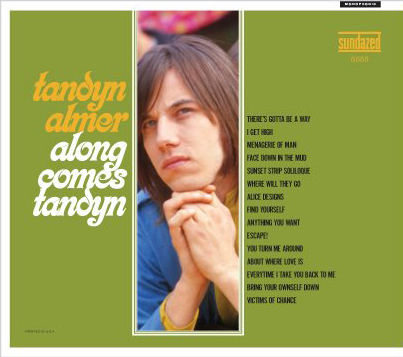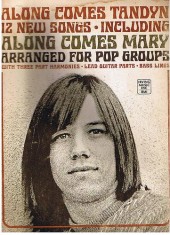| T O P I C R E V I E W |
| lemonade kid |
Posted - 21/02/2013 : 14:53:27
The psychodramas and the traumas gone, the songs are left unsung: Tandyn Almer, 1942-2013
January 14, 2013 By Dawn Eden 11 Comments

Yesterday I was humbled to attend the funeral of a remarkable man I never met in person, but without whose music the course of my life would have been much different: Tandyn Almer, the songwriter best known for penning the Association’s groundbreaking debut hit “Along Comes Mary.”The Association sing “Along Comes Mary” on “The Smothers Brothers Comedy Hour,” 1967
In 1988 I was a nineteen-year-old college student obsessed with learning everything I could about the recently deceased 1960s record producer Curt Boettcher, after being given some of his music by my songwriter friend Shane Faubert.
Curt’s big break was producing the Association’s “Along Comes Mary,” a song he had first heard from Tandyn himself, as the two were close friends and songwriting collaborators. Their friendship would sadly end over Curt’s insistence that he receive co-writing credit for having contributed significantly to “Along Comes Mary,” a claim Tandyn vehemently denied. (Curt had sung on Tandyn’s demo of the tune, and he alleged that, in singing it, he had altered the arrangement enough to make it essentially a different song.)
Although Curt’s claim to co-authorship of “Along Comes Mary” may have been wishful thinking, his production of the song “has stood the test of time,” as Al Kooper recently noted. Thanks to a YouTube user, you can hear the backing track and try to grasp how avant-garde both Almer’s melody and Boettcher’s production must have sounded to listeners in early 1966.
Almer’s composition fascinated Leonard Bernstein, who said in 1966, “I am a fanatic music lover. I can’t live one day without hearing music, playing it, studying it, or thinking about it. And all this is quite apart from my professional role as musician; I am a fan, a committed member of the musical public. And in this role of simple music lover, I confess, freely though unhappily, that at this moment, God forgive me, I have far more pleasure in following the musical adventures of Simon and Garfunkel or of The Association singing ‘Along Comes Mary’ than I have in most of what is being written now by the whole community of avant-garde composers. Pop music seems to be the only area where there is to be found unabashed vitality, the fun of invention, the feeling of fresh air.”
Bernstein featured “Along Comes Mary” in his “Young People’s Concert” episode titled “What Is a Mode?” In the case of “Along Comes Mary,” the answer is Dorian.
Along comes Mary, in the ancient and honorable Dorian mode—the same mode we just heard in Debussy and in the plain-chant. Now who’d have thunk it? What is that old Greek mode doing in today’s pop music? Well, I’ll tell you. From about the time of Bach until the beginning of our own century—roughly two hundred years—our Western music has been based almost exclusively on only two modes—the major and the minor. I can’t go into the whys and wherefores of it now, but it’s true. And since most of the music we hear in concerts today was written during that two hundred-year period, we get to think that major and minor modes are all there are. But the history of music is much longer than a mere two hundred years. There was an awful lot of music sung and played before Bach, using all kinds of other modes. And in the music of our own century, when composers have gotten tired of being stuck with major and minor all the time, there has been a big revival of those old pre-Bach modes. That’s why Debussy used them so much, and other modern composers like Hindemith and Stravinsky, and almost all the young song writers of today’s exciting pop music scene.
Through my research on Curt, I discovered other fantastic songs by Tandyn. One of the best was “Musty Dusty,” recorded in 1966 by Curt’s group the Ballroom, but unreleased until 1968, when it emerged (with minor sonic tweaks) on the first album by Sagittarius, Curt’s studio group with Beach Boys producer Gary Usher. More than twenty-five years after hearing it for the first time, it still gives me goosebumps.
Tandyn’s name was left off the writing credit for the Sagittarius album. Reportedly it was payback for Curt’s name being left off “Along Comes Mary” (perhaps instigated by Curt’s publisher, as one would like to think Curt would not have been so petty).
Along similar lines of toytown psychedelia is “Little Girl Lost and Found,” written by Tandyn along with Johnny Walsh. It was released in 1967 by studio group the Garden Club, featuring “Windy” songwriter Ruthann Friedman on lead vocals.
(On a very odd “Six Degrees of Separation” note, when I first discovered the Garden Club 45 in the 25-cent bin at Bleecker Bob’s in 1988, I noticed the B-side was co-written by a writer named Podell. The name was familiar to me because my mother had told me about a New Christy Minstrels member named Art Podell whom she had dated before she met my father. I ended up tracking down Art, who was very gracious, and told me stories about Curt, Tandyn, Biff Rose, and various figures he knew from the Sixties Los Angeles music scene. So, in a sense, I have a “family connection” to Tandyn.)
But let us return for a moment to “Dorian mode”-style Almer: “You Turn Me Around,” a composition of his that was recorded by the Ballroom in 1966. The song did not see the light of day until the CD era, when labels started unearthing rare Boettcher recordings (some of which had liner notes written by me).
Apart from “Musty Dusty,” my favorite Almer song is the wonderful ”Shadows and Reflections,” written with Larry Marks. It seems to me that whenever Tandyn had a co-writer, the collaborator’s contribution was mainly to the music, because his songs’ lyrics all have similarly sophisticated types of wordplay, internal rhyme, and so on.
In the early 1970s, Tandyn became best friends with Brian Wilson (who recalled Tandyn fondly in a 2011 interview). He contributed to the Beach Boys’ 1973 hit “Sail On, Sailor” as well as their album track “Marcella.” But shortly thereafter, he dropped out of the music business and moved to the Washington, D.C., area. He became a mysterious figure, the subject of rumors and legends, not unlike another hit songwriter, P.F. Sloan, whose enigmatic departure from the Los Angeles rock scene became the subject of a popular song by Jimmy Webb.
I had one encounter with Tandyn, phoning him out of the blue in 1990 after getting his number from my friend Phast Phreddie Patterson, who was then working at Warner Chappell Music Publishing. Understandably, he was not terribly enthusiastic about speaking to a young woman whose sole interest was finding out details of his work with Curt Boettcher. He did give me one piece of information that I found valuable: his erstwhile songwriting collaborator Johnny Walsh was, he said, the same John Walsh who hosted TV’s “America’s Most Wanted.” It was years before I discovered he was pulling my leg.
And so it was that I attended Tandyn’s funeral today, not as a friend, but as a fan, wanting to learn about the man I barely knew and share what information I had about his career with his family and friends. Other than myself and his sister-in-law, who organized the service, all those who attended were friends from Almer’s second life on the East Coast. Many knew him from his membership in the local Mensa and his songwriting for the venerable Washington, D.C., political-satirical musical-comedy review Hexagon.
It was beautiful, albeit bittersweet, to hear recollections of Tandyn, as it made me wish I had known him beyond that youthful phone call. One of the most memorable stories was from a performer who had worked with him in Hexagon who recalled hearing Tandyn say he had been interviewed by Leonard Bernstein on the 1967 CBS television special “Inside Pop.” The performer said he took Tandyn’s claim with a grain of salt—until one day, visiting the Museum of Broadcasting in New York City, he took a look at the archived video of the program. The very first image he saw was the face of his friend, chatting with the great composer—”and,” he noted in wonderment, “they’re lighting each other’s cigarettes.”
Leonard Bernstein: you see you’re supposed to say – to me – ‘you represent everything I hate’
Tandyn Almer: – but that’s not true -
Leonard Bernstein: I’m supposed to say to you ‘you represent everything I don’t understand…but so far I understand everything you’ve said, and so far you say you trust me
Tandyn Almer: – you shouldn’t look down on a whole group of people because of some of them, y’know …
Leonard Bernstein: Well, in addition to the age I represent – I represent, um, the bourgeouis family man, I represent an institution, like the New York Philharmonic which I am the head of -
Tandyn Almer: – I understand
Leonard lights Tandyn’s cigarette.
Leonard Bernstein: (continuing) I represent the ‘establishment’ if you wish – in a way I hate that word, and I don’t like to think of myself that way – but that’s something you would naturally rebel against
Tandyn Almer: (nodding) yes
Leonard Bernstein: but I don’t find you rebelling against me – I would like to … I want you to hit me, to tell me – [transcript via Arkonia]
But by far the most enlightening stories were those that Tandyn’s sister-in-law shared from his mother, now 94 and still in Tandyn’s home state of Minnesota.
When Tandyn was small, his mother used to read him a book every day at lunch. One day, when he was four, he announced to her that he would read her the book instead. And he did. Later—I think even that same day, if I heard correctly—his mother was doing dishes when she heard piano music coming from the next room. She didn’t think anything of it, thinking it was the phonograph. But when she walked into the room, she saw that the phonograph was not playing: it was Tandyn at the piano, playing by ear a classical piece he had heard. With two hands. She promptly took him to a local conservatory and he was admitted on the spot.
A few weeks later, Tandyn started kindergarten, and, a few weeks after that, his mother began getting phone calls from the school. The child was labeled a problem because he failed to pay attention. His mother insisted to school officials that he was extraordinarily advanced and needed more challenging schoolwork, but there were no “gifted and talented” classes in 1946. That was the beginning of a painful and isolating time for Tandyn.
Unless I’m getting the timeline wrong, I think it was a few years afterwards that Tandyn’s mother took him away with her from his father, who drank and had been increasingly abusive, both verbally and physically. The mother and child made their escape secretly, with the help of a relative. Tandyn grieved over having to leave behind his beloved dog.
The mother and child moved into a basement apartment, which his mother chose because it had two pianos. One day not long after—again, if I heard the timeline correctly—she came home to find he had moved the pianos together and was playing them both.
Hearing those stories of Tandyn’s childhood was a revelation for me. Although I had always loved “Musty Dusty” and “Little Girl Lost and Found,” I had thought their language was a bit affected. After all, lots of people were singing about lost toys and Alice in Wonderland in those days of flower children. Now, when I hear lyrics like “musty, dusty, tattered and torn, all of the toys I played with, … all of my memories shattered and gone,” they relate directly and powerfully to Tandyn’s lived experience. Likewise with “Shadows and Reflections” and its description of an “old vacant apartment” that is a reminder of a love that can no longer be found.
Tandyn’s friends from later life spoke of how he moved from one basement apartment to another. He could not go home again.
Yet, Tandyn in his way did make a home for himself, gathering to himself people over the years who loved his generosity of spirit and the way he had of bringing out the best in those around him. His humility was mentioned again and again by those close to him. Not something one would necessarily expect to hear about a celebrated genius.
I hope that someone from the Washington Post or another major publication writes an obituary of Tandyn so that those who know him only from his songs can know more about the beautiful personal achievements he attained despite many hardships. In the meantime, give a listen to the songs featured above and say a prayer for his repose.
To hear the songs...
http://www.patheos.com/blogs/feastofeden/2013/01/the-psychodramas-and-the-traumas-gone-the-songs-are-left-unsung-tandyn-almer-1942-2013/

thx, RW!

________________________________________________
Old hippies never die, they just ramble on.
-lk |
| 3 L A T E S T R E P L I E S (Newest First) |
| lemonade kid |
Posted - 12/01/2018 : 16:46:54
quote:
Originally posted by sometimesmylifeissoeerie
I'm just getting hip to Tandyn Almer, after finding out he wrote Along Comes mary.
It turned out he had a jazz duo with Bob Bruno of Circus Maximus.
Both of them played jazz piano and string bass, and they roomed together in LA for a while.
I emailed Bob about him, and he said tandyn tried to sell him nude photos of his black girlfriend the first time he met him!
Here's a great tune by Tandyn, sung by the great singer/songwriter/guitarist Ruthann Friedman:
https://www.youtube.com/watch?v=9IXibvbY0MA
forgot I posted this. Thanks for the reply, eerie!!

________________________________________________
The actual writing of a song usually comes in the form of a realisation.
I can't contrive a song. Ð GENE CLARK
|
| sometimesmylifeissoeerie |
Posted - 11/01/2018 : 01:04:12
I'm just getting hip to Tandyn Almer, after finding out he wrote Along Comes mary.
It turned out he had a jazz duo with Bob Bruno of Circus Maximus.
Both of them played jazz piano and string bass, and they roomed together in LA for a while.
I emailed Bob about him, and he said tandyn tried to sell him nude photos of his black girlfriend the first time he met him!
Here's a great tune by Tandyn, sung by the great singer/songwriter/guitarist Ruthann Friedman:
https://www.youtube.com/watch?v=9IXibvbY0MA |
| rocker |
Posted - 21/02/2013 : 22:46:29
Good stuff..I see even Lenny Bernstein thought he was real good!
|
|
|


